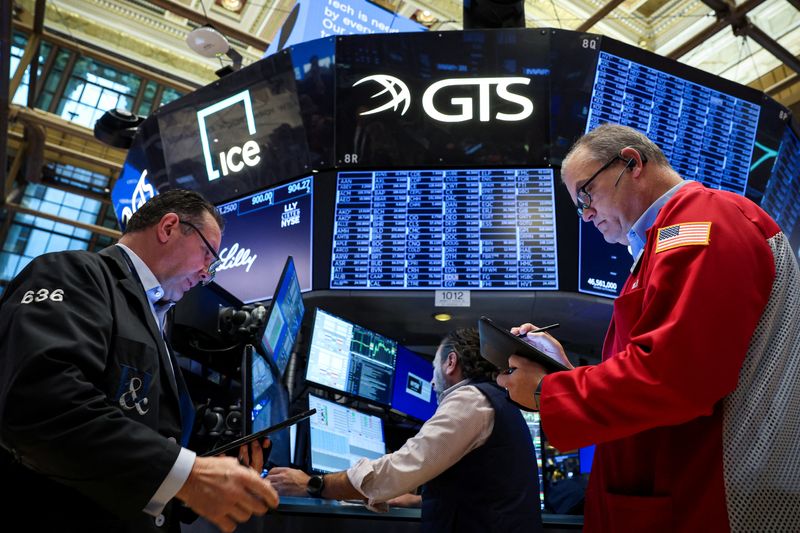A look at the day ahead in the US and global markets by Mike Dolan
The more than 20% rise in Tesla (NASDAQ:) share prices is whetting investor appetite for next week’s gains from most of the rest of the “Magnificent 7” of US megacaps – with overseas markets heading into the weekend elections in Japan and the United Kingdom are closely watching next week’s budget.
A relatively quiet end to a busy week is causing the market’s attention to shift to a host of big events coming up, not least the US election in eleven days’ time. But the related treasury market turmoil from earlier this week appears to have calmed down for now, and the race for the White House remains far too close.
Relatively upbeat economic data on business activity, unemployment claims and housing have done little to disturb the slightly calmer bond waters, especially as pressure on corporate prices appears to have eased further and oil prices have retreated.
The 10-year yield was hovering at 4.2% early Friday, with the Federal Reserve’s cyclical rate trough now seen as a high 3.5% — close to the highest estimates from Fed policymakers of the so-called “neutral” long-term policy rate.
They were also on par with government bonds.
For stocks, it was all about the profits. Tesla shares posted their biggest single-day gain in more than a decade as CEO Elon Musk’s forecast of rising sales reassured investors he was still focused on a core electric car business.
The stock spike puts Tesla shares back in the black for the year to date and now tilts the market towards updates from the other six megacaps next week – starting with Alphabet (NASDAQ:)’s quarterly results on Tuesday, Microsoft (NASDAQ:) 🙂 and Meta (NASDAQ:) on Wednesday and Amazon (NASDAQ:) and Apple (NASDAQ:) on Thursday.
Overall, the three days ended with losses, closing marginally higher on Thursday, with futures further higher ahead of Friday’s open.
The Japanese yen fell to 152 per dollar as Sunday’s election results and Wednesday’s Bank of Japan policy decision were awaited. Data showed inflation in Tokyo eased this month amid fresh government warnings about excessive currency movements.
For some investors, the risk of Japan ending up in a minority coalition after the weekend’s poll is raising some concerns that the BOJ could face complications in its quest to gradually normalize its ultra-easy interest rates.
Several recent opinion polls have increased speculation that the ruling coalition could lose its majority in parliament, which could cost new Prime Minister Shigeru Ishiba his job or force his Liberal Democratic Party to look for another coalition partner to join to remain in power.
And such a prospect could deprive the BOJ of the consensus support needed to continue raising rates, some think.
Britain provided the other big focus of the week ahead on Thursday, with reports of significantly higher borrowing to finance a public investment that is unnerving British government bonds.
Chancellor of the Exchequer Rachel Reeves said she will next Wednesday announce a change to the measure of public debt the government is targeting over five years, to allow billions of pounds of additional borrowing for investment.
Economists estimate that if this measure had been in place in March, it would have created room for more than 50 billion pounds ($65 billion) in additional borrowing, equivalent to about 1.5% of Greater Britain’s annual economic output Britain.
In stark contrast to the drop in US yields on Thursday, the UK bond market shuddered at the prospect of higher borrowing figures – with 10-year government bond yields hitting their highest level in almost four months and the five-year interest rate premium over Germany reaching its highest. this year.
However, the pound remained stable to firmer, showing no further disruption to investor confidence.
Elsewhere, most stock markets in Europe and Asia were higher on Friday, with some underperforming.
Ifo’s better-than-expected German business confidence figures have lifted some of the gloom over Europe’s largest economy, but there are lingering concerns about the country’s massive auto sector as trade tensions with China rise.
German carmaker Mercedes-Benz (OTC:) fell 3.7% after third-quarter earnings results from its main car division missed expectations by a huge margin, while French carmaker Mercedes-Benz (OTC:) Valeo (EPA:) lost 7.5% as the auto supplier cut its annual sales guidance for the second time this year.
Key developments that should give more direction to US markets later on Friday:
* US durable goods orders in September, University of Michigan consumer survey in October; Canada House prices in September, retail sales in August and government budget balance
* US corporate earnings: Aon (NYSE:), Colgate-Palmolive (NYSE:), Centene (NYSE:), HCA Healthcare (NYSE:)

* International Monetary Fund and World Bank annual meetings in Washington, speakers include German Finance Minister Christian Lindner, Budesbank President Joachim Nagel and Bank of Canada Governor Tiff Macklem
* Boston Federal Reserve Bank of President Susan Collins speaks
(By Mike Dolan,; mike.dolan@thomsonreuters.com)


